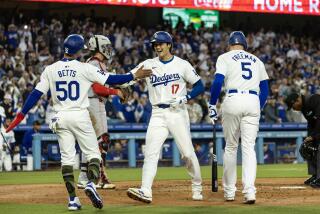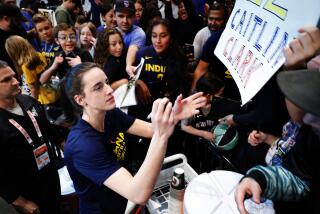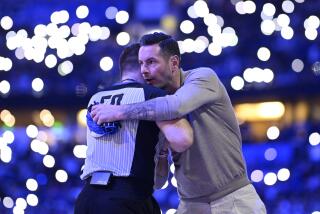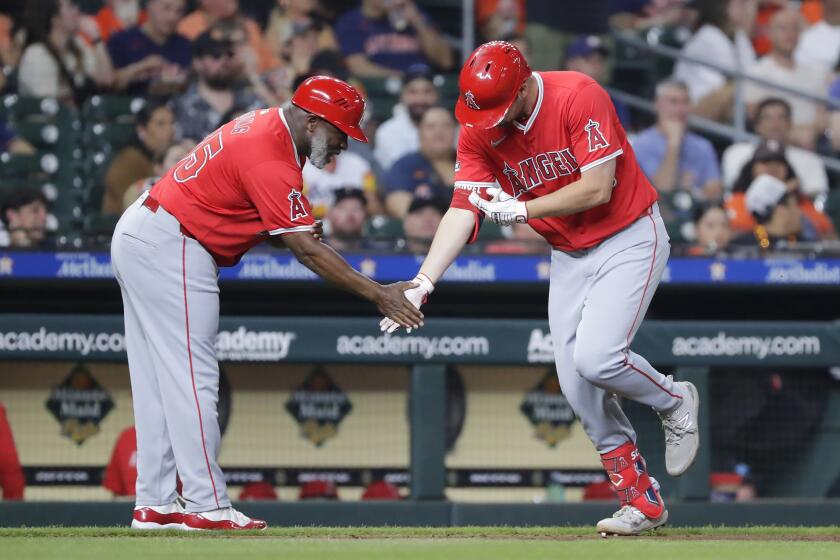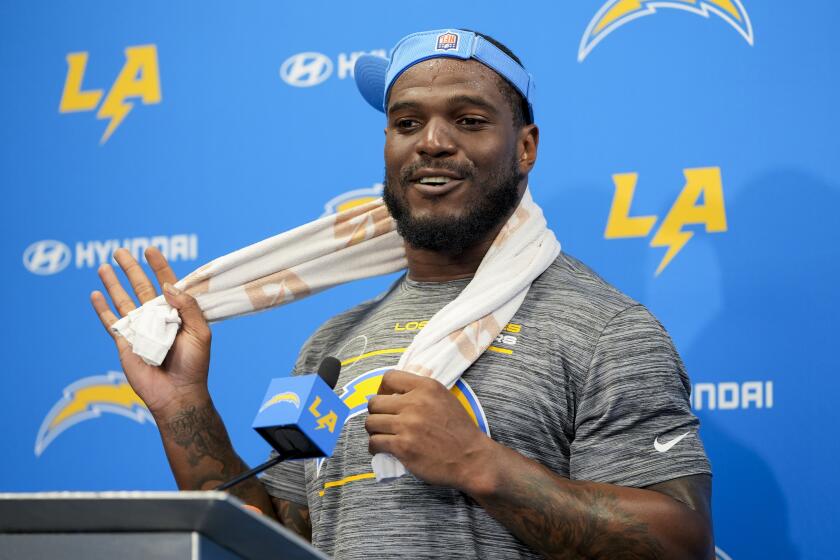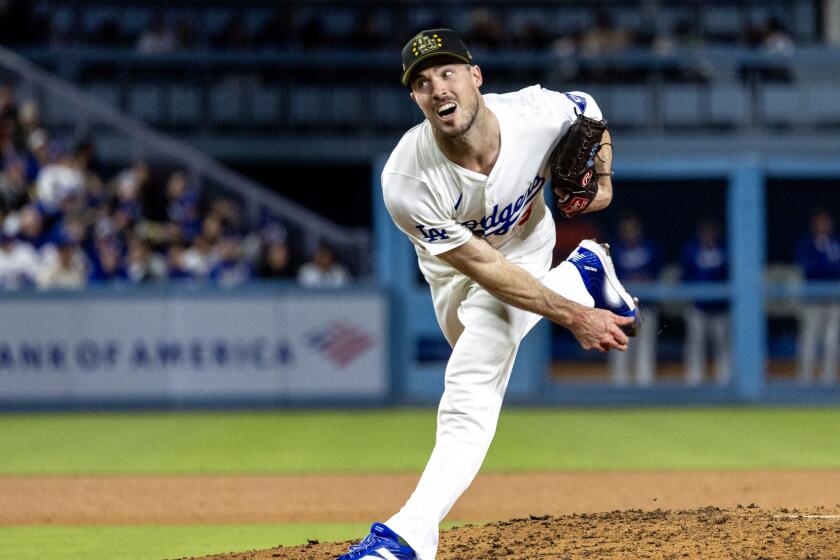Brown-Out
Fifty years ago today, the sad-sack St. Louis Browns played their last game. I was there, in the Knothole Gang, and if pressed I can come up with the names of the 3,173 other masochists who wandered into the park that day.
One of the die-hards, Richard Fisher, comes in for special mention. After the game, he waited on Spring Avenue, outside the Browns’ second-story clubhouse, and soon the No. 4 uniform shirt of the team’s manager, Marty Marion, sailed out of a louvered window, settling into little Richard’s arms.
The score on Sept. 27, 1953: Chicago White Sox 2, Browns 1, in 11 innings. That outcome was familiar but the closeness of the game was not. For the hapless Browns, who could easily lose 100 games in a season, even though the schedule then was only 154 games, run totals for opposing teams sometimes reached footballish extremes. In 1950, the Red Sox beat the Browns, 29-4. I remember a late-in-the-game photograph of Ted Williams. Boston’s peerless left fielder was leaning, one arm outstretched, against the inning-by-inning scoreboard at the base of Fenway Park’s outfield wall, an unending row of runs next to the home team’s name.
I keep catching myself saying that the Browns were exorcised at Sportsman’s Park, but in April of 1953, five days before the season opened, the flamboyant Bill Veeck, the cash-starved owner of the team, sold the park to Anheuser-Busch Inc. for $800,000, and the giant brewery, which had recently bought St. Louis’ other major league team, the Cardinals, changed the name of Sportsman’s to Busch Stadium.
“It was either sell the park or sell some of the players,” said Veeck, who was 71 when he died in 1986. “The park was a luxury that I felt we couldn’t afford. It needed a lot of repairs.”
In February 1953, Anheuser-Busch had bought the Cardinals, a team with a winning tradition, star players and a rabid following. In a nutshell, the Cardinals were everything the Browns were not. The Cardinals had been Veeck’s tenants at Sportsman’s Park, and now they became his landlord.
Veeck, who had won the World Series with the Cleveland Indians in 1948, was up to his artificial leg in debt, and knew that he couldn’t coexist with Gussie Busch, the beer baron. Still, Veeck signed a five-year ballpark lease with the brewery, at $175,000 a year. Sub rosa, without the American League’s blessing, he was frantically shopping the Browns’ franchise everywhere, including Los Angeles, but still, there were a payroll to be met, season tickets to be sold.
The good burghers of St. Louis were no rubes. Season-ticket cancellations outnumbered renewals, three to one, and the year began with only about 1,000 season-ticket holders signed up. A box seat, the most expensive ticket, cost $2.25, and it was 75 cents to sit in the bleachers.
According to Fred Nichols, who wrote “The Final Season,” Veeck said early on that he needed to average 11,000 a game to break even. The Browns, going 54-100 and finishing last in the eight-team league, drew just under 300,000.
In May, even before the losing streaks began piling up, 2,473 saw the Browns’ Bobo Holloman, a rookie right-hander, pitch a no-hitter against the Philadelphia Athletics. Holloman, 28, had never started a game. By July, with a 3-7 record, he cleared waivers -- which meant no other team wanted him -- and his contract was sold to the minor league club in Toronto. He never threw another big league pitch.
Veeck, who’d bought controlling interest in the Browns for $500,000 in July of 1951, had long since reached the bottom of his bag of tricks. Eddie Gaedel, the 3-foot-7 midget, had drawn his four-pitch walk in August of Veeck’s first year; Max Patkin, the double-jointed, rubber-faced clown who’d “coached” first base, had moved on; “Grandstand Managers’ Night,” during which a group of fans dictated Manager Zack Taylor’s strategy by holding up placards in the grandstand, was a one-time gimmick, and Satchel Paige, the ageless relief pitcher who had helped Veeck win the pennant in Cleveland, was only cosmetic respite from the Browns’ overall incompetence.
In the Knothole Gang, though, we were loath to complain. We got in free to all 77 home games and, despite the Browns’ buffoonery, the New York Yankees and the Red Sox each came to town for 11 games a summer. There were doubleheaders that we hoped would never end. After the first couple of innings, we’d move from the right-field pavilion to the grandstand, where the ushers were happy to have the company. One night, Jimmy Piersall, Boston’s mentally disturbed young outfielder, was thrown out of a game, changed into civvies and joined us in the pavilion. For an inning or two, he led us in a loud chant of “We want Piersall.”
By mid-June of 1953, though, this frustrated teenager had had enough. In one day, Veeck sold Willie Miranda, a promising switch-hitting shortstop, to the Yankees, and traded Virgil “Fire” Trucks and Bob Elliott to the Chicago White Sox for pitcher Lou Kretlow and catcher Darrell Johnson. Trucks had been the Browns’ best pitcher. He had pitched two no-hitters for Detroit in 1952 and in 1953 he would win 20 games, five with the Browns and 15 with the White Sox. Elliott had been the Browns’ RBI leader, but paramount for Veeck was the $120,000 he received in the two transactions. That would stall some of the creditors for a few more weeks.
“Frank Lane [general manager of the White Sox] has very shrewdly pulled the woll [sic] over your eyes,” I wrote in a long, naive letter that Veeck never answered. “... I see no reason for wild deals like this.... You made a promise that the Browns will stay in St. Louis. I guess that statement has been forgotten.... You have done enough to make this year of baseball with the Browns downright miserable. I’m sure all your fans (if their [sic] are any left beside me) feel the same way.”
Then, the last-line kicker:
“I have a lot more to say, but as you can see, their [sic] isn’t much paper left.”
OK, so it wasn’t exactly a young Judy Garland doing “Dear Mr. Gable.” And where was spell-check when I needed it?
By Sept. 27, the Browns were not only out of bucks, but out of baseballs as well. Before the final series against the White Sox, they preserved their small stock by skipping pregame batting practice. They ran out of balls by the sixth inning of the final game, and for two innings the umpires, fittingly, allowed the use of dirty batting-practice balls. In the ninth inning of a tie game, the umps turned to the White Sox for a supply of balls. After Chicago’s Bill Wilson had caught a fly hit by the Browns’ Jim Dyck for the last out, he held a ball that was scarred with a deep gash.
Veeck was hung in effigy twice, before and during the game. The Browns finished 46 1/2 games behind the Yankees, who won the pennant for the fifth consecutive year. In Veeck’s memoir, “Veeck As in Wreck,” he quoted Dan Topping, co-owner of the Yankees, as saying, “We’re going to keep you in St. Louis and bankrupt you. Then we’ll decide where the franchise is going to go.”
Two days after the finale, American League owners met in New York, where they unanimously approved the sale of the Browns to a Baltimore group for $2,475,000. Their first year in Baltimore, the Orioles, nee Browns, drew a million fans, even though they finished with the same 54-100 record. They wound up 57 games behind the Indians, but Philadelphia, losing 103 games, was even worse.
“Why wouldn’t they have lost 100 again?” said 81-year-old Don Lenhardt, the ex-Brownie who had started 1954 in Baltimore before being traded to the Red Sox. “They had many of the same players from the year before.”
Lenhardt played left field and got two hits in the Browns’ last game.
In memory of this abysmal franchise, which won its only pennant in 1944, when many of the best players were at war, Bill McCurdy wrote a Casey-at-the-bat ode to the Browns. In the last verse, McCurdy alluded to George Sisler, their incomparable first baseman, who’d hit .407 in 1920 and .420 in 1922:
Oh, somewhere in this favored land, the sun is shining bright;
The band is playing somewhere, and somewhere hearts are light;
And somewhere men are laughing, and little children shout;
But there’s no joy in Sislerville -- the Brownies have pulled out.
More to Read
Get our high school sports newsletter
Prep Rally is devoted to the SoCal high school sports experience, bringing you scores, stories and a behind-the-scenes look at what makes prep sports so popular.
You may occasionally receive promotional content from the Los Angeles Times.
